
Latin American Journal of Content & Language Integrated-LACLIL
Scope & Guideline
Cultivating Effective Teaching Practices Through Research
Introduction
Aims and Scopes
- Content and Language Integration:
The journal emphasizes studies that investigate how content subjects can be taught alongside language learning, promoting bilingualism and multilingualism in educational settings. - Innovative Teaching Methodologies:
LACLIL showcases research on diverse teaching methodologies, including project-based learning, the use of technology in the classroom, and emotional engagement strategies to enhance language acquisition. - Teacher Development and Identity:
There is a consistent focus on the professional development of teachers within CLIL contexts, examining their needs, identities, and the impact of training on teaching effectiveness. - Student Perspectives and Engagement:
The journal highlights research that captures student perspectives, engagement, and experiences in CLIL environments, providing insights into how learners interact with content and language. - Contextual Factors in Education:
LACLIL investigates the influence of contextual factors on the implementation of CLIL, including cultural, institutional, and social dimensions that affect teaching and learning.
Trending and Emerging
- Digital Learning Environments and Technology Integration:
A growing body of research is focusing on the integration of digital tools and virtual learning environments in CLIL, highlighting their role in enhancing language and content learning outcomes. - Critical Thinking and Active Citizenship:
There is an increasing emphasis on incorporating critical thinking and active citizenship into CLIL curricula, promoting higher-order thinking skills and social awareness among students. - Emotional Engagement in Learning:
Research exploring the emotional dimensions of learning within CLIL contexts is gaining traction, emphasizing the importance of emotional well-being and motivation in language acquisition. - Teacher Training and Professional Development:
Emerging themes highlight the need for ongoing teacher training and development in CLIL, focusing on equipping educators with the skills and knowledge to effectively implement CLIL methodologies. - Student-Centered Approaches and Co-Creation:
There is a notable trend towards student-centered pedagogies and the co-creation of learning materials, reflecting a shift towards collaborative and participatory learning environments.
Declining or Waning
- Traditional Language Teaching Methods:
There is a noticeable decrease in research centered around traditional, grammar-focused language teaching methods, as the journal increasingly emphasizes integrated and innovative approaches. - General Language Proficiency Assessments:
The focus on general language proficiency assessments is waning, with fewer studies addressing standardized testing in CLIL contexts, possibly due to a shift towards more holistic assessment practices. - Examining CLIL in Primary Education:
Research specifically targeting CLIL implementation in primary education settings has become less frequent, suggesting a shift towards higher education contexts or more specialized applications. - Focus on Non-CLIL Subjects:
There is a reduced emphasis on studies exploring non-CLIL subjects, indicating a narrowing of focus towards purely CLIL-related topics and methodologies.
Similar Journals
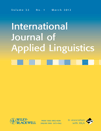
International Journal of Applied Linguistics
Leading the Discourse in Applied Linguistics ScholarshipInternational Journal of Applied Linguistics, published by WILEY, is a premier platform for cutting-edge research in the field of applied linguistics. With a notable Impact Factor and ranked in the top Q1 quartile of linguistics and language, this journal serves as an essential resource for scholars, practitioners, and students. The journal’s wide-ranging scope includes various subfields such as language acquisition, language education, sociolinguistics, and discourse analysis, fostering multidisciplinary approaches to language studies. It has achieved a significant Scopus Rank, placing it in the 90th percentile for both Arts and Humanities as well as Social Sciences categories, reflecting its high visibility and influence in the academic community. The International Journal of Applied Linguistics is committed to advancing the understanding of language use in real-world contexts through rigorously peer-reviewed articles that contribute to both theory and practical applications. While it is not an open-access journal, it remains a highly respected publication for researchers looking to disseminate and acquire knowledge in applied linguistics.
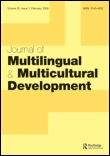
JOURNAL OF MULTILINGUAL AND MULTICULTURAL DEVELOPMENT
Advancing Understanding in a Multilingual WorldPublished by Routledge Journals, Taylor & Francis Ltd, the JOURNAL OF MULTILINGUAL AND MULTICULTURAL DEVELOPMENT has established itself as a premier platform for scholarly discourse in the fields of cultural studies, linguistics, and education since its inception in 1980. With a significant focus on the multifaceted nature of language and culture, this journal offers invaluable insights that contribute to our understanding of multilingualism and multiculturalism in a globalized world. The journal commands an impressive impact, holding Q1 rankings across three critical categories as of 2023, reflecting its influence within the academic community: 22nd percentile in Cultural Studies, 45th in Linguistics and Language, and 215th in Education. Relevant researchers, professionals, and students are encouraged to engage with groundbreaking research, methodologies, and discussions that highlight the dynamic interconnection of language and culture. To access the journal, please visit Routledge’s dedicated platform, where you can explore a wealth of resources and stay updated on the latest findings up to 2024.

Journal of Science Education and Technology
Integrating Innovation in Science Education.The Journal of Science Education and Technology, published by SPRINGER, stands as a premier platform in the fields of education and engineering, recognized with a prestigious Q1 ranking in both categories as of 2023. With an ISSN of 1059-0145 and an E-ISSN of 1573-1839, this journal serves as a pivotal resource for researchers, educators, and practitioners alike, emphasizing the integration of scientific inquiry and technological advancements in educational contexts. Since its inception in 1992, the journal has consistently provided high-quality, peer-reviewed research that shapes contemporary practices and methodologies in science education. With its notable Scopus rankings, including a 95th percentile in Social Sciences Education, the journal is essential for anyone eager to enhance their understanding of effective teaching in STEM fields. While the journal is not open access, its contributions are invaluable to advancing knowledge and innovations that are crucial for the progressive education landscape, making it a must-read for scholars and students committed to excellence in science education.

Guiniguada
Advancing educational innovation through open dialogue.Guiniguada is a leading open-access journal established in 2015, published by the University of Las Palmas de Gran Canaria within its Public and Scientific Diffusion Services. With its ISSN 0213-0610 and E-ISSN 2386-3374, the journal provides a platform for innovative research and critical discourse in the field of education sciences, fostering a multidisciplinary approach to educational practices and policies. Situated at the heart of Spain's vibrant academic community, Guiniguada aims to bridge the gap between theoretical frameworks and practical applications, making it an invaluable resource for researchers, educators, and students alike. As an open-access journal, it enhances the global dissemination of knowledge, ensuring that cutting-edge research is freely available to all. The journal's commitment to advancing educational research underscores its significance in shaping contemporary educational practices and influencing policy decisions.

Unterrichtspraxis-Teaching German
Championing Effective Strategies for German Language AcquisitionUnterrichtspraxis-Teaching German is a prominent academic journal published by WILEY, dedicated to advancing the field of German language teaching and pedagogy. With its ISSN 0042-062X and E-ISSN 1756-1221, this journal serves as a vital resource for educators, researchers, and students working to improve methodologies and outcomes in the teaching of German. Although it does not currently offer Open Access options, [[the journal remains committed to high-quality scholarly contributions that foster innovative practices and theoretical advancements in language education. Based in Hoboken, NJ, the journal has established a reputation for its rigorous peer-review process and relevance across multilingual education contexts. In a world where language skills are increasingly important, Unterrichtspraxis-Teaching German plays a crucial role in promoting effective teaching strategies and contributing to the broader discourse surrounding language acquisition and pedagogy.
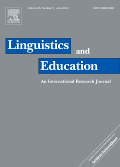
Linguistics and Education
Exploring the Nexus of Language and LearningLinguistics and Education, published by Elsevier, is a premier journal dedicated to advancing the understanding of the intersections between linguistics and educational practices. With its ISSN 0898-5898 and E-ISSN 1873-1864, this journal has established itself as a significant platform since its inception in 1988, continuing to produce impactful research up to 2024. It enjoys a prestigious Q1 ranking in both the Education and Linguistics and Language categories, reflecting its high-quality contributions and leading role in the field. The journal’s Scopus rankings further underscore its influence, being placed in the 87th percentile for Arts and Humanities in Language and Linguistics, and the 86th percentile in Social Sciences in Linguistics and Language. Although it operates under traditional subscription access, its contributions are essential for researchers, professionals, and students alike, making substantial strides in the understanding of language, learning environments, and pedagogical strategies. The journal's objective is to foster interdisciplinary dialogue and disseminate innovative research that informs educational policy and practice.
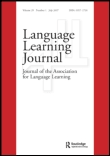
Language Learning Journal
Advancing the discourse in language acquisition.Welcome to the Language Learning Journal, a premier resource for researchers, educators, and linguists alike, published by Routledge Journals, Taylor & Francis Ltd. With a proud history dating back to 1990 and commitment to advancing the exploration of language acquisition, this esteemed journal boasts an impressive impact factor within Q1 rankings across both the Education and Linguistics and Language categories. Ranked #40 in Language and Linguistics and achieving a 96th percentile in the Arts and Humanities, the journal serves as a crucial platform for disseminating cutting-edge research, innovative methodologies, and impactful discussions in the field of language learning. Although currently not offered as an open access publication, the depth and quality of content ensure significant contributions to the body of knowledge for professionals and scholars. With its global reach, the Language Learning Journal is dedicated to fostering the development and understanding of language learning processes, enabling readers to stay informed about the latest trends and findings through rigorous peer-reviewed articles.
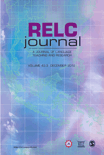
RELC Journal
Bridging Cultures and Classrooms WorldwideRELC Journal, published by SAGE Publications Ltd, stands as a leading platform in the fields of Education and Linguistics, boasting an impressive Q1 ranking in both categories according to the latest metrics. Established in 1970 and continuing its commitment to academic excellence through 2024, the journal features rigorous peer-reviewed research that explores the intersections of language, culture, and pedagogy. With a notable Scopus ranking that places it in the 98th percentile for both Language and Linguistics (Rank #16/1088) and Education (Rank #91/1543), the RELC Journal is essential for scholars, educators, and practitioners seeking to contribute to and stay abreast of cutting-edge developments in their respective fields. Although currently not open access, the journal remains accessible to a diverse audience and invites contributions that challenge conventional perspectives and inspire innovative practices in language education.
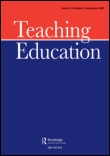
Teaching Education
Enhancing educational practices for global impact.Teaching Education, published by Routledge Journals, Taylor & Francis Ltd, is a pivotal journal in the field of educational studies, with an ISSN of 1047-6210 and an E-ISSN of 1470-1286. Established in the United Kingdom, this journal has significantly contributed to the discourse on educational theory and practice since its inception in 1987, with a focus on research that enhances teaching methodologies and promotes effective learning environments. With a commendable Scopus rank of 419 out of 1543 in the Social Sciences - Education category, placing it in the 72nd percentile, it attracts a diverse range of scholarly contributions that elevate the quality of education worldwide. Although it does not offer open access, Teaching Education remains an essential resource for researchers, educators, and policy makers interested in the latest developments and insights in educational practices, making it a valuable addition to any academic library.
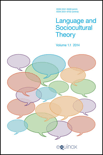
Language and Sociocultural Theory
Illuminating Language's Role in Sociocultural ContextsLanguage and Sociocultural Theory, published by EQUINOX PUBLISHING LTD, stands as a vital resource for scholars in the domains of linguistic studies and cultural theory. With its ISSN 2051-9699 and E-ISSN 2051-9702, this UK-based journal has consistently achieved Q1 rankings in both Cultural Studies and Linguistics and Language as of 2023, demonstrating its significant impact within the academic community. The journal's position is further affirmed by its rankings in Scopus, where it occupies the 80th percentile in Cultural Studies and the 72nd percentile in Linguistics and Language, making it a leading platform for cutting-edge research. Though not an Open Access journal, it provides critical insights into the interconnectedness of language and sociocultural dynamics, making it essential reading for researchers, professionals, and students eager to explore the complexities of human communication. Spanning converged years from 2014 to 2023, the journal presents a rich collection of scholarly articles that strive to advance the field and inspire further academic inquiry.